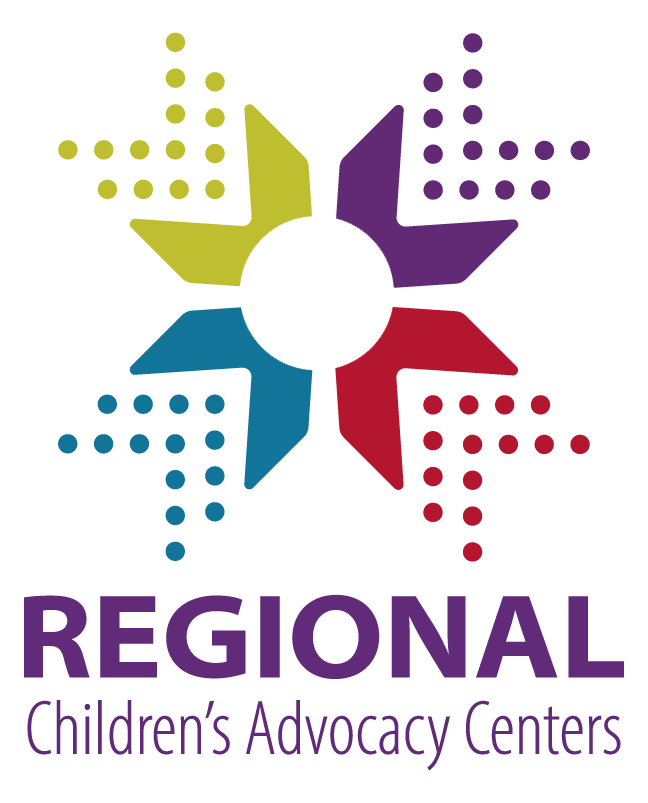Our Resource Library is organized in an easy-to-navigate table format, with all materials sorted alphabetically by title. To streamline your search, you have the option to refine results by Author or Category. Additionally, a keyword search function is available to help you quickly locate specific resources.
Disclaimer: Although the RCACs regularly review materials to ensure they are current, resources shared from other sources may change links or be updated without notice. If you encounter any issues with broken links or outdated material, please reach out at regionalcacs@gmail.com to help us maintain a useful and accurate resource library.
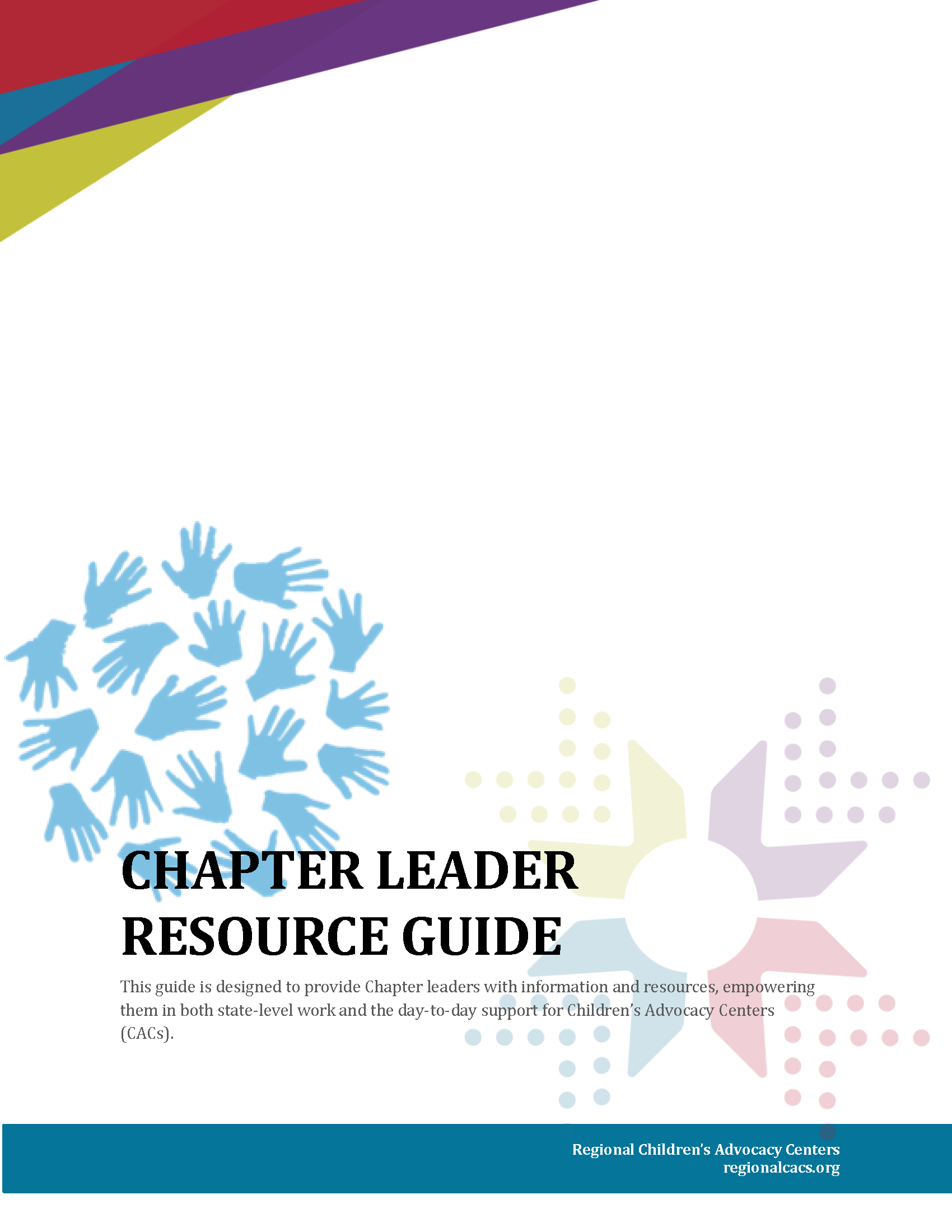
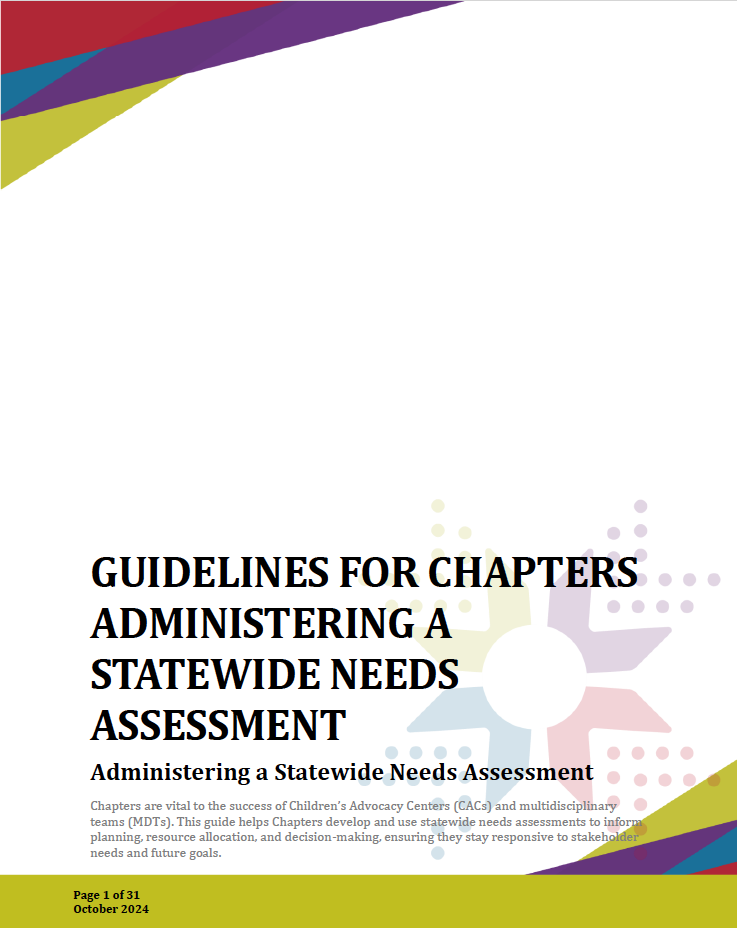
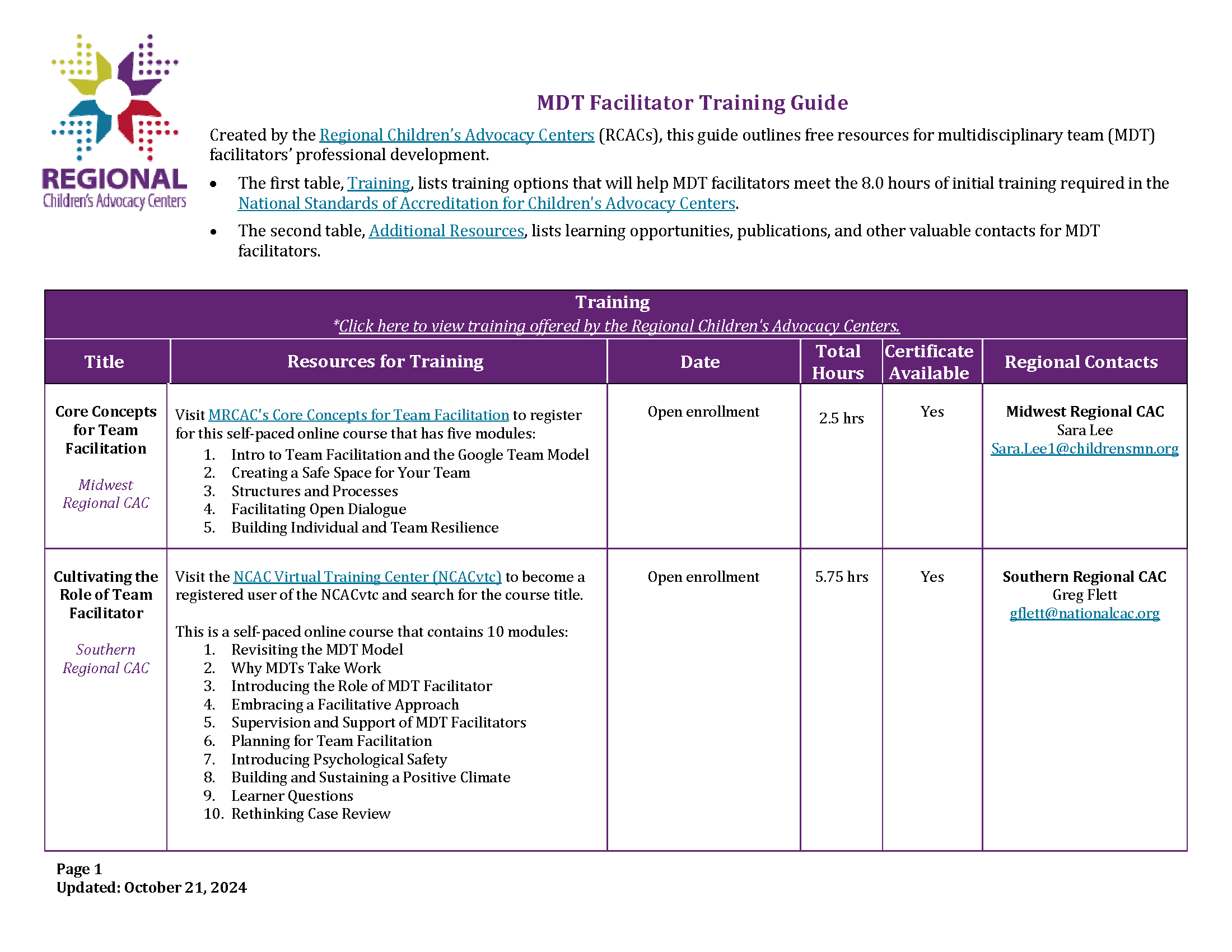
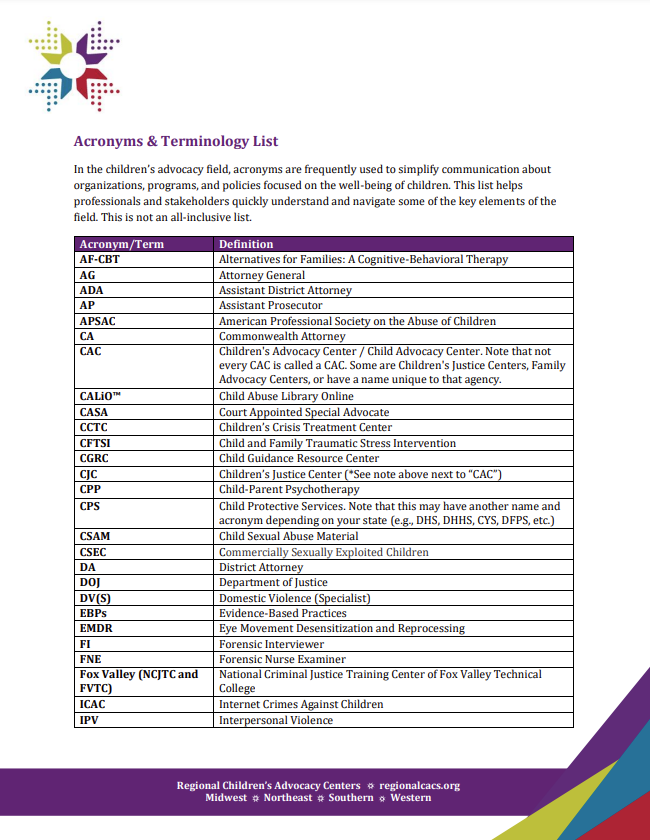
To download a resource, click on the following icon: ![]()
To preview a resource, click on the following icon: ![]()
Most Common Tags/Keywords:
|
|
| Title | Summary | Categories | Link | hf:doc_categories |
|---|---|---|---|---|
| Board Bundle for CACs and Chapters | This collection, created by SRCAC, is a comprehensive guide for CACs and Chapters to strengthen board governance and leadership. | CAC Management, Chapter Resources | cac-mgmt chpt-rsrcs | |
| Building a Better Case Review Together Video | This training video, created by NRCAC in 2020, highlights the importance of case review, provides an example of what case review can look like, and discusses the value of representatives from each discipline attending. | Multidisciplinary Team | mdt | |
| Chapter Leader Resource Guide | This guide, created by the RCACs and NCA in 2025, provides Chapter leaders with information and resources, empowering them in both state-level work and the day-to-day support for CACs. | Chapter Resources | chpt-rsrcs | |
| Child Victims with Disabilities ASD: Overview and Strategies | This guide, created by NRCAC in 2021, provides an overview and strategies for working with children with Autism Spectrum Disorder. | Special Topics | spec-top | |
| Child Victims with Disabilities Non-Verbal: Overview and Statistics | This guide, created by NRCAC in 2021, provides an overview and strategies for interviewing children who are non-verbal. | Special Topics | spec-top | |
| Child Victims with Disabilities: Overview and Statistics | This guide, created by NRCAC in 2020, provides an overview and statistics on child victims with disabilities. | Special Topics | spec-top | |
| Child Victims with Disabilities: Resource Guide | This guide, created by NRCAC in 2020, provides resources for child victims with disabilities. | Special Topics | spec-top | |
| Children with Problematic Sexual Behavior: Recommendations for the Multidisciplinary Team and Children’s Advocacy Center Response | This guide, created by SRCAC, is for MDTs and CACs addressing children with problematic sexual behavior. | Forensic Interviewing, Multidisciplinary Team | fi mdt | |
| Competency Review Spreadsheet | This resource, created by SRCAC, is a practical tool for CACs to assess and track team competencies. | CAC Management | cac-mgmt | |
| Considerations for the MDT and CAC Approach to Recantation | This research paper, created by SRCAC in 2017, outlines research from the past decade related to children’s disclosure of abuse, caregiver support, and recantation. | Forensic Interviewing, Multidisciplinary Team | fi mdt | |
| Ensuring Well Being of Children: A Comprehensive Approach to Trauma-Informed Care for CACs | This guide, created by NCA and NRCAC in 2018, offers support for CACs to help identify children in need of treatment and make referrals to evidence-based treatments that are proven to reduce trauma symptoms. | Mental Health | mntl-hlth | |
| Evidence-Based Mental Health Treatments for Child Abuse Victims | This guide, created by NCA and NRCAC in 2018, provides an overview of evidence-based mental health treatments for child abuse victims for brokers and multidisciplinary teams. | Mental Health | mntl-hlth | |
| Executive Evaluation | This guide, created by SRCAC, is for CACs and Chapters to implement effective executive evaluation processes. | CAC Management | cac-mgmt | |
| First Responder Disability Awareness Full Resource Guide | This guide, created by NRCAC in 2021, provides resources for first responders and being prepared to encounter individuals with a disability. | Special Topics | spec-top | |
| Grant Administration Initiative Chapter Readiness Guide | This guide, created by SRCAC, is a companion resource for State Chapters preparing to implement or enhance their grant administration processes. | Chapter Resources | chpt-rsrcs | |
| Guidelines for Chapters Administering a Statewide Needs Assessment | This guide, created by the RCACs in 2024, helps Chapters develop and use statewide needs assessments to inform planning, resource allocation, and decision-making, ensuring they stay responsive to stakeholder needs and future goals. | Chapter Resources | chpt-rsrcs | |
| Helping Your Child Heal from Abuse | This guide, created by NCA and NRCAC in 2018, offers support for parents and caregivers dealing with child abuse, emphasizing the pivotal role they play in their child’s healing process and explaining how a CAC and MDT can provide assistance in keeping the child safe and facilitating their recovery. | Mental Health | mntl-hlth | |
| Listen and Learn: A Process for Initiating Collaboration Between Tribal Communities and Children’s Advocacy Centers | For CACs who are interested in building relationships with tribal communities in their areas, this guide, created by SRCAC in 2019, will help you gain a better understanding of the “Listen and Learn” concept, how to initiate contact with tribal leaders with the help of your state Chapter, your Regional CAC, and NACA (Native American Children’s Alliance); and how to plan and conduct a successful Listen and Learn. | Special Topics | spec-top | |
| MDT Facilitator Training Guide | This training guide, updated by the RCACs in 2023, lists opportunities to help multidisciplinary team (MDT) coordinators/facilitators access training to help meet the 8.0 hours of instruction required in the revised 2023 National Children’s Alliance Standards for Accreditation. | Multidisciplinary Team | mdt | |
| Medical Linkage Agreement | This sample linkage agreement created by the RCACs in 2022 is meant to serve as a resource for CACs when providing Medical Health Referral, Assessment and Treatment. Please note this is intended as a SAMPLE and should be carefully reviewed by the CAC Board of Directors or other governing entity so that it accurately reflects YOUR partnership with community agencies. | Medical | med | |
| Medical Provider Guidelines: What is the Role of the Medical Provider for Children Under 12 with Problematic Sexual Behaviors (YPSB)? | This document helps CACs and State Chapter organizations identify gaps in medical care for child sexual abuse victims and offers steps to enhance this care. | Medical | med | |
| Mental Health Linkage Agreement | This sample linkage agreement created by the RCACs in 2022 is meant to serve as a resource for CACs when providing Mental Health Referral, Assessment and Treatment. Please note this is intended as a SAMPLE and should be carefully reviewed by the CAC Board of Directors or other governing entity so that it accurately reflects YOUR partnership with community agencies. | Mental Health | mntl-hlth | |
| Minimal Facts Guidelines | This guide, created by NRCAC in 2020, assists first responders in obtaining minimal facts during initial responses to abuse allegations, with the aim of reducing trauma to child victims and avoiding redundant interviews. | Multidisciplinary Team | mdt | |
| Multidisciplinary Team Enhancement Initiative Readiness Guide for State Chapters | This guide, created by SRCAC, is a resource to support State Chapters in assessing their readiness for multidisciplinary team enhancement initiatives. | Chapter Resources | chpt-rsrcs | |
| NCA and RCACs Support for Chapters | This document, created in 2022, highlights the areas in which the RCACs and NCA partner or coordinate to provide excellent service to Chapters and identifies the areas where we specialize or work independently. | Chapter Resources | chpt-rsrcs | |
| NRCAC Self Care Chart | This chart, created by NRCAC in 2020, offers a variety of self-care ideas including physical, psychological, emotional, professional, and personal, while also providing space for you to write your own ideas. | Mental Health | mntl-hlth | |
| Providing Training to CACs Readiness Guide for State Chapters | This guide, created by SRCAC in 2022, is designed for those Chapter organizations who may be considering developing and delivering training curriculums to their CACs. | Chapter Resources | chpt-rsrcs | |
| Psychological First Aid Guide for Children’s Advocacy Center Supervisors | This manual, created by SRCAC in 2016, will empower organizations to proactively prepare for and effectively manage critical incidents, safeguarding their credibility and integrity in the face of unexpected challenges. | CAC Management | cac-mgmt | |
| RCAC Acronym & Terminology List | This list, created by the RCACs, helps professionals and stakeholders quickly understand and navigate some of the key elements of the field. | CAC Management, Chapter Resources, Forensic Interviewing, Medical, Mental Health, Multidisciplinary Team, Special Topics, Victim Advocacy | cac-mgmt chpt-rsrcs fi med mntl-hlth mdt spec-top va | |
| Resources for Meeting the Victim Support and Advocacy Standard | This guide, created by the RCACs in 2023, is intended to help CACs meet the Victim Support and Advocacy Standard for Accreditation for NCA. | Victim Advocacy | va | |
| Statewide Case Management System: Readiness Guide for State Chapters | This guide, created by SRCAC in 2022, is designed for those Chapter organizations who may be deciding whether to implement a statewide case management system. | Chapter Resources | chpt-rsrcs | |
| The Chapter Guide: Facilitating Peer Learning Cohorts for CACs | This guide, created by the RCACs in 2023, is designed to help Chapters create and facilitate successful Peer Learning Cohorts for CACs and MDT partners. | Chapter Resources | chpt-rsrcs | |
| The Medical Exam in Child Sexual Abuse Cases: What MDT Partners Need to Know | This training video, created by NRCAC in 2020, highlights the importance of medical exams, the importance of specialized professionals, and why “normal is normal” when it comes to results. | Medical | med | |
| The Outcomes Framework | This resource, developed by SRCAC, serves as a foundational guide for CACs and Chapters to measure and evaluate program effectiveness. | CAC Management | cac-mgmt | |
| The Value of the Investigative Team Video | This training video, created by NRCAC in 2022, highlights the importance of law enforcement, child protective services, and prosecution in the multidisciplinary team, and the value of the collaborative investigative process. | Multidisciplinary Team | mdt | |
| Updated Guidelines for the Medical Assessment and Care of Children Who May Have Been Sexually Abused | This manuscript highlights the significance of medical evaluations in the clinical and legal processes of suspected child sexual abuse, emphasizing the need for practitioners to stay informed on current evaluation protocols and interpretation of medical findings. | Medical | med | |
| Victim Advocacy Linkage Agreement | This sample linkage agreement, created by the RCACs in 2022, is meant to serve as a resource for CACs when providing victim advocacy services. Please note this is intended as a SAMPLE and should be carefully reviewed by the CAC Board of Directors or other governing entity so that it accurately reflects YOUR partnership with community agencies. | Victim Advocacy | va | |
| Victim Advocate Case Flow Chart | This infographic, created by NRCAC in 2020, is designed as a reference for CACs collaborating with three advocates throughout the life of a case and can be modified to make it consistent with your services. | Victim Advocacy | va | |
| Working with Children with Disabilities in Child Abuse Cases Video | This training video, created by NRCAC in 2022, spotlights the dynamics of working with children with disabilities in child abuse cases from the perspectives of forensic interviewers, first responders, and prosecutors. | Special Topics | spec-top | |
| WRCAC Telemental Health Resource Center | This website hub, created by WRCAC in 2019 and updated in 2024, serves to educate and inform the CAC community about Telemental Health as an option, as it is still not widely employed among CACs. The updated TMHRC reflects a focus on supporting Chapters, CAC Directors, Mental Health and Advocacy staff in implementing TMH services. | Mental Health | mntl-hlth |
We invite you to peruse the comprehensive resource pages provided by our VOCAA partners. By clicking the button below, you will gain access to a curated selection of materials designed to enhance your knowledge and expertise. We encourage you to take this opportunity to explore these valuable resources at your convenience.
